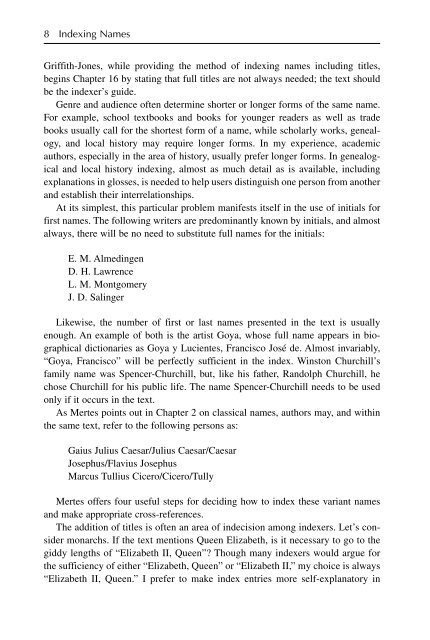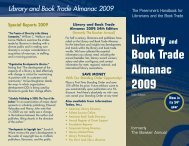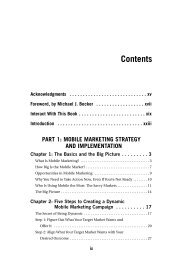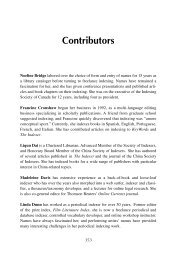8 Indexing NamesGriffith-Jones, while providing the method of indexing names including titles,begins <strong>Chapter</strong> 16 by stating that full titles are not always needed; the text shouldbe the indexer’s guide.Genre and audience often determine shorter or longer forms of the same name.For example, school textbooks and books for younger readers as well as tradebooks usually call for the shortest form of a name, while scholarly works, genealogy,and local history may require longer forms. In my experience, academicauthors, especially in the area of history, usually prefer longer forms. In genealogicaland local history indexing, almost as much detail as is available, includingexplanations in glosses, is needed to help users distinguish one person from anotherand establish their interrelationships.At its simplest, this particular problem manifests itself in the use of initials forfirst names. The following writers are predominantly known by initials, and almostalways, there will be no need to substitute full names for the initials:E. M. AlmedingenD. H. LawrenceL. M. MontgomeryJ. D. SalingerLikewise, the number of first or last names presented in the text is usuallyenough. An example of both is the artist Goya, whose full name appears in biographicaldictionaries as Goya y Lucientes, Francisco José de. Almost invariably,“Goya, Francisco” will be perfectly sufficient in the index. Winston Churchill’sfamily name was Spencer-Churchill, but, like his father, Randolph Churchill, hechose Churchill for his public life. The name Spencer-Churchill needs to be usedonly if it occurs in the text.As Mertes points out in <strong>Chapter</strong> 2 on classical names, authors may, and withinthe same text, refer to the following persons as:Gaius Julius Caesar/Julius Caesar/CaesarJosephus/Flavius JosephusMarcus Tullius Cicero/Cicero/TullyMertes offers four useful steps for deciding how to index these variant namesand make appropriate cross-references.The addition of titles is often an area of indecision among indexers. Let’s considermonarchs. If the text mentions Queen Elizabeth, is it necessary to go to thegiddy lengths of “Elizabeth II, Queen”? Though many indexers would argue forthe sufficiency of either “Elizabeth, Queen” or “Elizabeth II,” my choice is always“Elizabeth II, Queen.” I prefer to make index entries more self-explanatory in
Seven-Problem Approach to Indexing Names 9identifying a particular person, not causing the user to have to pause and wonderfor a second or two who is meant.Aristocratic names consisting of both a title and a family name pose the problemof whether to add the unmentioned one. This usually arises where aristocratsare known for personal achievements. The poet known as Byron, or Lord Byron,was the 6th Baron Byron. His first and family names were George Gordon Byron.For a book about his poetry, it would be appropriate to index him as “Byron,George Gordon, 6th Baron” only if the author and treatment require, or seem torequire, this full form. Otherwise, any of the following would be quite sufficient,depending on the wording in the text:Byron, George, LordByron, LordSee also White’s use of this example in <strong>Chapter</strong> 14.The aristocratic title can come later in life, after a person has achieved prominenceunder his or her own name. Both White and Griffith-Jones (<strong>Chapter</strong> 16)introduce the example of a British prime minister, Benjamin Disraeli, later elevatedto the aristocracy as the Earl of Beaconsfield. When he is referred to as Disraeli,which would be most of the time, there’s no need to add “Earl of Beaconsfield.” Hisfull handle would be appropriate only where his life as Earl of Beaconsfield istreated substantially or for a work concentrating on the collective earls ofBeaconsfield. Similarly, for a book about Margaret Thatcher’s political career, theaddition of “Baroness” would usually be unnecessary.In <strong>Chapter</strong> 15 on religious names, Mertes advises that, in general, the title “St.”need not be included in an entry unless the editor or author requests it, or it seemsparticularly appropriate. She then suggests four possible methods for adding it tothe name. Similarly, the title “pope” may be added for disambiguation, or wherereaders with less familiarity with religious names could benefit from this guidance.Dutch and German cataloging practice, as Pitchford’s <strong>Chapter</strong>s 4 and 6 explain,demonstrate minimalism with titles. White advises: “Most terms of address can beignored in the index.” In <strong>Chapter</strong> 16, Griffith-Jones provides examples of the correctuse of titles when they are to be added but states that full names plus titles areoften unnecessary. Context—or “it depends”—is pretty well everything here.Variant and changes of name raise the question of whether a person’s other, orformer or later, names should be added as a gloss to the heading. These names aredealt with later in the section “Variant Names Borne by One Person, IncludingChanges of Name,” but with regard to this particular section, it depends on whetherthese glosses are needed for clarity, as often happens with women with both marriedand birth surnames. For example, I used “Bennett, Myra (née Grimsley)”where a chapter in the book was devoted to Myra Bennett, who changed her name








